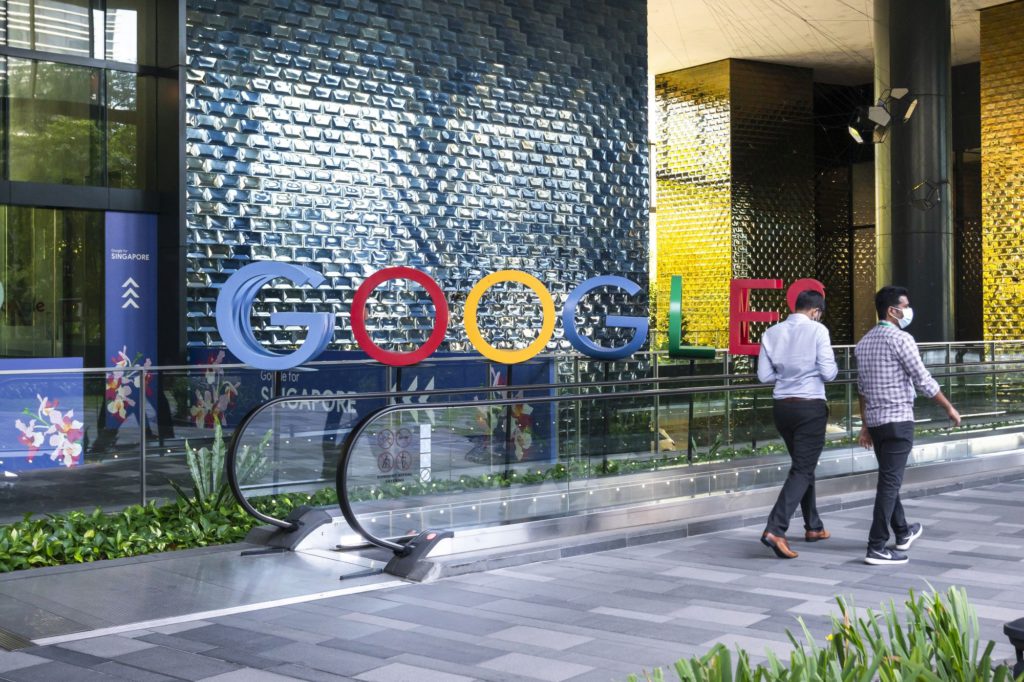(Bloomberg) — Contract workers at Google’s data centers allege that they were fired for supporting a union and faced retaliation after pushing for better benefits, according to a pair of complaints filed this week with the US National Labor Relations Board.
(Bloomberg) — Contract workers at Google’s data centers allege that they were fired for supporting a union and faced retaliation after pushing for better benefits, according to a pair of complaints filed this week with the US National Labor Relations Board.
The Alphabet Workers Union, whose members include both direct employees and subcontracted staff for Google’s parent company, claims that two workers at a data center in Council Bluffs, Iowa, were terminated for discussing their working conditions and because of their affiliation with the labor organization, according to documents viewed by Bloomberg.
Another worker at the site faced retaliation for having a role in the union, according to the complaint, which was filed on Wednesday against Google and Modis, an information-technology firm that serves as a subcontractor.
Labor groups have been pushing to make inroads this year in big tech companies, long seen as resistant to union organizing. In addition to Google, Amazon.com Inc. and Apple Inc. have faced labor campaigns in recent months — with mixed results.
In another complaint filed with the NLRB on Wednesday, two contract security guards working at Google data centers in North and South Carolina allege that they lost their security clearances after discussing working conditions. The workers said they had spoken out about a lack of benefits such as sick days and parental leave and have been unable to work without their security clearances.
The cases appear to be the first in which Alphabet Inc. workers were fired for their union membership, according to Parul Koul, a Google software engineer and the executive chair of AWU, a so-called minority union that doesn’t have collective bargaining authority but advocates on behalf of workers. Google is named in the complaints as a “joint employer,” or a company with sufficient control over a group of workers to be legally liable for their treatment.
Google didn’t have an immediate comment. Modis, which is owned by Adecco Group AG, didn’t immediately respond to a request for comment.
Claims filed with the NLRB are investigated by regional officials. If they find merit in the allegations and can’t secure a settlement, they issue a complaint on behalf of the labor board’s general counsel, which is considered by an agency judge. Those judges’ rulings can be appealed to the NLRB members in Washington and then to federal court.
The agency has the authority to order companies to reinstate fired workers and change policies, but generally can’t hold executives personally liable for alleged wrongdoing or issue any punitive damages.
Last year, another NLRB complaint filed by AWU on behalf of a subcontracted Google data-center worker in South Carolina led to a settlement. As part of that agreement, the tech giant promised to obey federal law by not silencing workers about their pay.
The treatment of the workers in Council Bluffs violates that settlement, AWU alleges. In June, one of the workers, Eli Cave, who uses they and them pronouns, suggested a walkout to protest a new timekeeping system that they feared could lead to lost wages. Shortly thereafter, a manager said Cave’s actions “could be considered insubordination” and threatened to put Cave on a performance improvement plan, according to a statement of facts in the case viewed by Bloomberg.
In July, two other workers at the site, Dustin Sommers-Hehn and Leilani Morton, met in the data center’s common area to discuss working conditions, according to the statement of facts. Later that week, management gave Sommers-Hehn a “final warning” for having a “union meeting” and told Morton that discussing unions was forbidden, the document states. Sommers-Hehn and Morton learned in August and October, respectively, that their contracts wouldn’t be renewed.
The other complaint filed Wednesday is tied to security guards at Google contractor Allied Universal. Earlier this year, Allied workers realized they weren’t receiving key benefits, such as sick days, special leave for Covid-19 and parental leave, though they were guaranteed under Google’s minimum benefits standards for US contractors, according to the complaint.
Allied rolled out some benefits in September after a petition circulated by employees attracted hundreds of signatures, workers said. Cynthia West, who was working as a security guard in North Carolina, said she helped organize the petition, but she feels she has paid a steep price. Shortly after accepting a new job at another Google contractor on the site, she learned that she had lost her security clearance.
A representative for Allied didn’t have an immediate comment.
Although she was employed by Google’s contracting firms, West said that the client bears responsibility for working conditions on the site.
“The client does or should have some culpability for that,” said West, 37, who is cited by the AWU complaint. “If they don’t know, they need to know.”
Another worker who is part of the complaint against Google and Allied, Heather Smith, said she had spoken out about the lack of benefits and also advocated on behalf of a pregnant colleague.
In late September, she learned she had lost her security clearance. “It was a blow out of nowhere,” said Smith, 31. “I was terminated without them actually saying ‘terminated.’”
(Adds detail from complaint in sixth paragraph.)
More stories like this are available on bloomberg.com
©2022 Bloomberg L.P.











